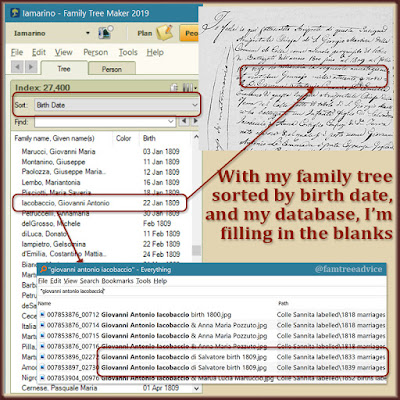I have genealogy super powers. I've been doing a massive amount of work to build my research database. I made tens of thousands of Italian vital record images searchable on my computer. I can piece together more of my extended family than ever before.
Recently, I made the Pesco Sannita vital records searchable by name. That's my great grandmother's hometown, and I was eager to find more of her ancestors. Then I remembered a past project of mine. It involved locating documents to fill in missing birth dates in my family tree. Now I can also search for people from Pesco Sannita.
I spent the weekend finding documents and filling in missing birth dates. To do this, I arranged my list of people by birth year in Family Tree Maker and went straight to 1809. That's when the Italian government began recording births.
 |
| I'm using my super powers to fill in an many blanks as possible in my family tree. |
For many people in my tree, I knew what year they were born based on their age when they had a child. But that isn't reliable. I had to search for their birth or marriage to learn exactly when they were born.
I wanted to speed up my progress. My goal is to add relationships that can tie me to more DNA matches. I decided to break a cardinal rule. I did something drastic. I added dates and names to my family tree WITHOUT adding the document image or source citation.
That isn't as bad as it sounds. My tree has 27,400 people as I write this. I'm related to the majority of the people by marriage, not blood. That's how it was in small towns back then. All the families intermarried. I can return to the document on my computer at any time. Whenever I need to firm-up that family unit, I can do so easily. I can find the documents again, add them to my tree, and create the source citation.
I would never do this fast-paced fact gathering with any other type of document. It would be completely crazy to add, say, facts from a census form without saving the form and its citation info. But I have this unique opportunity to build out dead ends in a hurry.
I set to it, working on each incomplete or estimated birth date from 1809–1847, so far. It's so gratifying. I keep thinking it's like shooting fish in a barrel. And it's addictive.
One by one, I found a person's missing birth date. Sometimes I found their marriage and death record in the same search results. For each marriage record, I added:
- the dates of their marriage banns, license and church ceremony
- their spouse's name and birth date
- both their parents' names and some of their facts.
Many times the right documents proved I could merge together 2 people in my tree with the same name.
 |
| You already have the interest. Dive into the genealogy documents and you will learn. |
Aside from finding what I need, there's a great value to examining every document from a town the way I do. Horribly scribbled names do not slow me down. I know the last names from each of my towns well. They're as familiar to me as my own. I can recognize by their name if a spouse is an out-of-towner.
In fact, I taught myself to read these difficult old documents by diving right in. Each time I found an unfamiliar Italian word, I looked it up. Dates were always written in long hand, so I had to memorize the words for months and numbers. I learned exactly where to look for key facts on different types of documents.
My husband doesn't understand how I can look at the scribbles on my computer screen and pull out the facts I want. But we all learn what we need to learn. He can read a schematic diagram because he's an engineer. I can read old Italian vital records because I'm an Italian genealogy researcher.
You can develop your genealogy super power, too. Don't give up and say you can't read another language. Go to the FamilySearch Wiki and find the genealogy keywords for the country you need. You don't need to understand every single word. Then dive in and get familiar with your surroundings. Learn all the names in town. Find your family. Be your family's superhero.
I have had to learn some Russian to read documents my father's line...it's really hard, not so much because of the words themselves, but the script in many cases is just awful. I work at it when I have time.
ReplyDeleteEven for my English line, it's not always easy, as often the minister appeared to be using a quill with very little point left on it or was writing so quickly, the letters melded together...but, in the end, isn't it the challenge that motivtes us?
If you can manage a block of time to keep viewing that bad handwriting, it will get clearer. I've seen some really bad ones, but if you can pick out the words you need, you will get the hang of it.
Delete